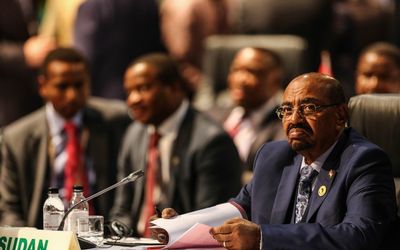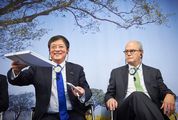SUDANESE President Omar al-Bashir did not enjoy any immunity from arrest when he came to SA in June last year, the Southern African Litigation Centre (Salc) reasons in its legal argument to the Supreme Court of Appeal.
The government was heavily criticised for allowing Mr Bashir, wanted by the International Criminal Court (ICC) for genocide, war crimes and crimes against humanity, to flee SA despite an interim court order that he should not be allowed to leave.
Mr Bashir was in the country for an African Union summit. Before he could leave, the Salc made an urgent application to court arguing he should not be allowed to leave until it had decided whether he should be arrested in order to be brought before the ICC.
His dramatic escape, which unfolded as the High Court in Pretoria was hearing argument, earned the government a blistering rebuke when the court eventually ruled, over an apparent disregard for the rule of law.
In heads of argument filed in court on Friday, Wim Trengove SC, counsel for the Salc, recounted the crimes the Sudanese president is wanted for: the "unholy trinity" of genocide, war crimes and crimes against humanity.
Mr Bashir was alleged to have been the "mastermind" behind "large-scale extermination, murder, rape, torture, forcible transfer and pillaging of civilians", he said.
The High Court found that SA had a duty to arrest Mr Bashir and ordered it do so.
But the government appealed to the Supreme Court of Appeal, arguing that, as a sitting head of state, Mr Bashir was immune from arrest before a South African court. But Mr Trengove said the state’s argument was "unfounded".
He said five rulings of the ICC had already "conclusively determined" that ICC members including SA, were obliged to arrest and surrender Mr Bashir.
The arrest provisions in SA’s Implementation of the Rome Statute of the International Criminal Court Act did not leave any room for a suspect to claim immunity against arrest, he said.
"The necessary implication ... is accordingly that any such immunity is negated."
The Implementation Act domesticates the Rome Statute, the international convention that established the ICC.
Mr Trengove also said that section 10(9) of the act expressly stated that the fact that a suspect was a sitting head of state was not a ground for refusing his surrender to the ICC. The state’s interpretation of the law created "an intolerable anomaly", he said.
In terms of the act, SA may arrest and prosecute for international crimes in its own domestic courts. The ICC may also prosecute. But the government then argued that, when it comes to SA, arresting someone in order to send him or her to the ICC, this was not permitted, said Mr Trengove. This was incongruous, he said.
The government’s argument — that section 10(9) only applied to procedures after arrest — was "blinkered", he said.
The case is due to be heard next Friday in Bloemfontein.

Sudanese president Omar al- Bashir at the African Union summit in Johannesburg in June last year. Picture: THE TIMES
SUDANESE President Omar al-Bashir did not enjoy any immunity from arrest when he came to SA in June last year, the Southern African Litigation Centre (Salc) reasons in its legal argument to the Supreme Court of Appeal.
The government was heavily criticised for allowing Mr Bashir, wanted by the International Criminal Court (ICC) for genocide, war crimes and crimes against humanity, to flee SA despite an interim court order that he should not be allowed to leave.
Mr Bashir was in the country for an African Union summit. Before he could leave, the Salc made an urgent application to court arguing he should not be allowed to leave until it had decided whether he should be arrested in order to be brought before the ICC.
His dramatic escape, which unfolded as the High Court in Pretoria was hearing argument, earned the government a blistering rebuke when the court eventually ruled, over an apparent disregard for the rule of law.
In heads of argument filed in court on Friday, Wim Trengove SC, counsel for the Salc, recounted the crimes the Sudanese president is wanted for: the "unholy trinity" of genocide, war crimes and crimes against humanity.
Mr Bashir was alleged to have been the "mastermind" behind "large-scale extermination, murder, rape, torture, forcible transfer and pillaging of civilians", he said.
The High Court found that SA had a duty to arrest Mr Bashir and ordered it do so.
But the government appealed to the Supreme Court of Appeal, arguing that, as a sitting head of state, Mr Bashir was immune from arrest before a South African court. But Mr Trengove said the state’s argument was "unfounded".
He said five rulings of the ICC had already "conclusively determined" that ICC members including SA, were obliged to arrest and surrender Mr Bashir.
The arrest provisions in SA’s Implementation of the Rome Statute of the International Criminal Court Act did not leave any room for a suspect to claim immunity against arrest, he said.
"The necessary implication ... is accordingly that any such immunity is negated."
The Implementation Act domesticates the Rome Statute, the international convention that established the ICC.
Mr Trengove also said that section 10(9) of the act expressly stated that the fact that a suspect was a sitting head of state was not a ground for refusing his surrender to the ICC. The state’s interpretation of the law created "an intolerable anomaly", he said.
In terms of the act, SA may arrest and prosecute for international crimes in its own domestic courts. The ICC may also prosecute. But the government then argued that, when it comes to SA, arresting someone in order to send him or her to the ICC, this was not permitted, said Mr Trengove. This was incongruous, he said.
The government’s argument — that section 10(9) only applied to procedures after arrest — was "blinkered", he said.
The case is due to be heard next Friday in Bloemfontein.





















Change: -0.47%
Change: -0.57%
Change: -1.76%
Change: -0.34%
Change: 0.02%
Data supplied by Profile Data
Change: -1.26%
Change: -0.29%
Change: -0.47%
Change: 0.00%
Change: -0.42%
Data supplied by Profile Data
Change: 1.39%
Change: 1.38%
Change: 1.07%
Change: 1.03%
Change: 1.17%
Data supplied by Profile Data
Change: 0.12%
Change: -0.31%
Change: 0.39%
Change: -1.21%
Change: -2.39%
Data supplied by Profile Data